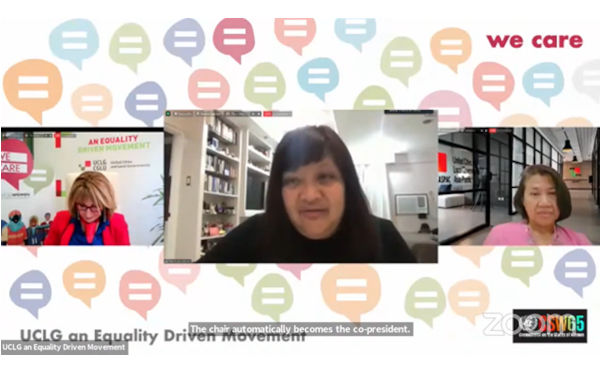As the month marking the International Women’s Day is coming to an end, United Cities and Local Governments (UCLG) held a series of discussions throughout March 2021 regarding what is called the Feminist Municipal Movement.
It was established during the opening session od the Local and Regional Governments’ Days on the 17th of March held by UCLG CGLU, UCLG Women and CSW65, calling for enhancing local feminist leadership, and of women’s participation in decision-making as well as public life.
This is important because for transformation to happen, there needs to be, as participants reminded, more women making decisions and carrying out feminist policies that place care at the core. When done effectively, the movement can contribute to strengthening city diplomacy, as said by Ada Colau, Mayor of Barcelona, UCLG Special Envoy to the United Nations and for the 2030 Agenda.
“Our feminist municipal movement believes in the collaboration between the cities, in the strength of municipalism, of proximity, and the power of city diplomacy as a transformative and solidarity-based tool to achieve the future we want.”
As it is important, it is also reflected into the UCLG ASPAC agenda through a Standing Committee of Women in Local Government which focuses on enhancing the number of women’s participation in the Council. And in supporting it, the Secretary General of UCLG ASPAC together with one of co-presidents of UCLG ASPAC, Mayor of Iriga City, also joined the session.
During the discussion, participants even moved the discussion beyond leadership. This includes encouragement of young activists that can bring the movement to new heights, and also what the feminist municipal movement entails.
To answer that, women mayors and participants during the event responded with ideas and concrete measures such as increasing the role of men in the conversation about feminism and gender-based violence, and that is where placing care at the centre comes in. It means ensuring that care is undertaken by both men and women as women are often left with layered or double burdens at home, particularly during the pandemic.
Furthermore, It is breaking the intergenerational hierarchy of feminist movements to make feminism a “cross-cutting issue” and can be implemented in planning and budgeting. In other words, there is a need to go beyond political will and into carrying out advocacy work, as well as empowering and accompanying women so that they are present in decision-making mechanisms.
This notion was also highlighted by Madelaine Alfelor, Mayor of Iriga City, UCLG Treasurer and one of co-presidents of UCLG ASPAC. In the context of feminist municipal movement in the Asia Pacific, Madelaine raised that UCLG ASPAC has a Standing Committee of Women in Local Governments. Then, she addressed that in Philippines women participation in political is still low where for example out of 80 provinces, there are only 7 women governors and out of 146 city mayors, there are only 40 women in office. And following to this figure, she shared her experience as a woman mayor how gender stereotypes still exist to which she handled by instilling a more inclusive approach through her decision-making.
“I was criticised based on my gender, and I have heard statements saying that we women are fickle minded, we are very weak. I had to achieve and prove them wrong, so I have to put special focus on social change, at least by facilitating inclusive, holistic communities and I have to share my power, authority and decision-making in our pursuit of our legal, political, economy and cultural equality.”
Therefore, Mayor Madelaine emphasized that to strengthen women’s participation in decision-making and public life also needs a holistic approach, particularly when overcoming structural barriers that can prevent women from participating and carrying out their full potential as, for example, city leaders.
Before the closing session, Mayor Madelaine also reminded participants that all efforts to empower women and improving their role as leaders will contribute to achieving SDG 5 on Gender Equality. “This is important especially the local level to tackle problematic issues such as child marriage in Indonesia and teenage pregnancy in the Philippines,” she added.
Written by the KM Team
Source: Session on Feminist Municipal Movement: Putting Care at the Center, UCLG World, 17 March 2021











